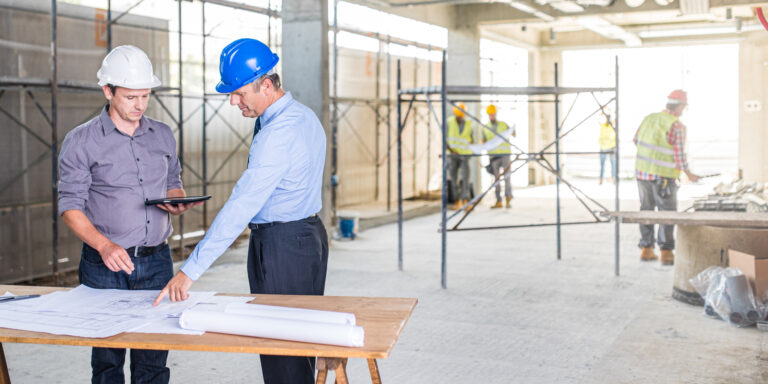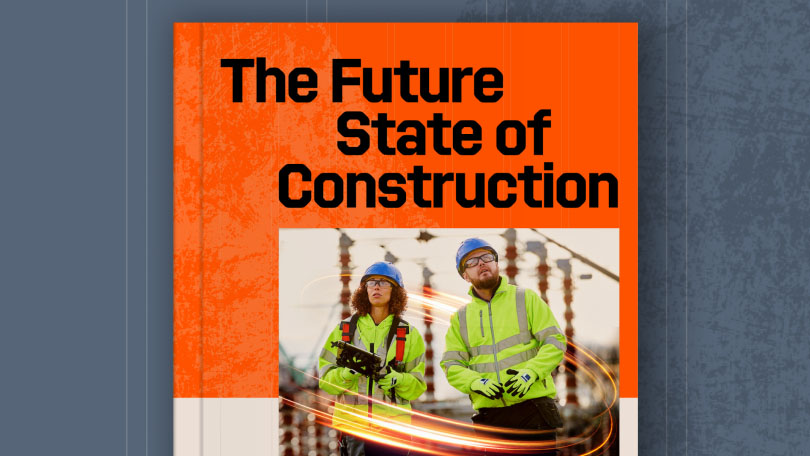— 6 min read
How a Construction Programme Helps Projects Run Smoothly

Last Updated Aug 28, 2025

Daniel Kavanagh
Solution Specialist, Industry Compliance
15 articles
Daniel Kavanagh is a Senior Strategic Product Consultant at Procore, based in Dublin, Ireland. Daniel is a results-oriented project manager with a passion for building relationships and exceeding client and management expectations, with career experience in project management, systems implementation, technical design and architectural finishes. Daniel has been a member of the construction industry since 2014, and graduated from the Carlow Institute of technology.

Nicholas Dunbar
Content Manager
62 articles
Nick Dunbar oversees the creation and management of UK and Ireland educational content at Procore. Previously, he worked as a sustainability writer at the Building Research Establishment and served as a sustainability consultant within the built environment sector. Nick holds degrees in industrial sustainability and environmental sciences and lives in Camden, London.
Last Updated Aug 28, 2025

Construction programmes are a vital project management tool that bring transparency and clarity to the client and the contractors involved in a construction project. They help senior construction workers to manage teams, allocate resources, proactively track timelines, and make sure that the work and schedule align with client expectations.
Table of contents
What is a construction programme?
A construction programme is a detailed plan that outlines the timelines for a construction project from start to finish. It clarifies the different phases, deadlines, and handovers of rooms and areas, and usually includes Gantt charts to help visualise the order of activity and any overlaps in phases. A Gantt chart is an organisational chart that lists each different task on the left-hand side and the project dates at the top. Each task has its own line, and duration of the task is coloured in under the dates it needs to take place.
Key Components
The construction programme is made up of lots of different types of project information which all contribute to the overarching plan or schedule. Some of these components include:
Tasks
These are individual, standalone activities that need to be completed such as site preparation and electrical installations.
Timelines
Timelines are the time frame allocated to each task or phase of work. The timeline includes the start date and end date for each task, showing the team how long they have to complete the work.
Dependencies
Dependencies are relationships between tasks that affect the order in which construction teams can complete the work. A dependency means that one task depends on the other being completed — or at least advanced to a certain stage — before work can begin on the following task. An example of this is painting and plastering: starting the painting work is dependent on first finishing the plastering.
Milestones
These are key moments in a project that mark when a significant phase is finished, such as obtaining permits or completing the building’s foundations.
Resources
Resources include the labour, materials, equipment, and subcontractors that the main contractor needs to complete the project.
Critical Path
The critical path is the sequence of tasks that must be completed on time, so as to avoid delays to the master schedule. It is the longest sequence of tasks without any flexibility, as a change in timeline would result in missing deadlines.
Project Risks
Every project has risks, and some of these are unavoidable — weather delays and labour shortages are two examples. Risk management is an important part of creating a realistic construction programme.
Learn about the future of the built environment - Read Procore's Future State of Construction report
Learn how contractors, subcontractors, and project teams can take advantage of new opportunities to boost efficiency and profitability over the next decade. Download the report to get your roadmap to the future state of construction.

Why is a construction programme important?
The construction programme is an important tool for both the construction company and the client. Creating and agreeing on a construction programme is part of the contractual requirements, protecting the client and construction company from unexpected surprises in the project.
As an example for why this is important, let’s imagine we are building a hotel. The owners and managers of the hotel want to start taking bookings before the hotel is built to ensure that they can generate revenue as soon as it is ready. So, they start taking bookings for rooms while the construction team is working.
With a construction programme in place, the construction team understands when they need to finish the building. If there wasn’t a construction programme to follow, it could lead to overruns which mean that the hotel owner needs to cancel their guests’ bookings. This may also mean the hotel owner demands these lost fees from the construction company.
By putting a construction programme in place — and agreeing upon it before moving onto the build phase — the client and the construction company have a transparent, fair timeline to work towards.
Step-by-Step Guide to Creating Effective Construction Programmes
Creating a construction programme requires a lot of information and a good amount of experience. They are complex, with lots of moving parts and dependencies. To make sure they are achievable, a thorough, knowledgeable professional needs to run the process. Here is a guide for how they might approach the creation of a construction programme. Every professional will have their different methods and means, so this is only an example of one of many ways to approach it.
Common Challenges
Construction programmes are complex and require the input of a lot of stakeholders. They are also dependent on factors such as supply chains and labour availability, so they can be a challenge to create. Here are some other common challenges that may impact the creation or following of construction programmes:
+ Geopolitical factors
Situations such as Brexit and the Russia-Ukraine war have had an unprecedented impact on the ability to confidently create a construction programme due to changing labour laws and unstable supply chains.
+ Weather conditions
Weather can be unpredictable and many aspects of construction can’t go ahead in poor weather conditions due to safety risks. This can affect the accuracy of estimates of how long a particular phase in the construction programme will take to complete and can mean straying from the programme.
+ Unexpected discoveries
Sometimes, construction teams make discoveries that can mean work needs to stop while professionals investigate. For example:
On one project, I was project managing the construction of a shopping centre. I got a call in the middle of the night saying that the civils team had dug into graves! Obviously, all work had to stop just in case we needed to contact the police. It turned out to be diesel tanks that had been concreted over in a previous project, but we still ended up with delays to the programme while we made sure everything was safe. Surprises like this can mean that you can have the most thorough, detailed construction programme, but it’s not guaranteed that you won’t have challenges to face and remediate.

Daniel Kavanagh
Solution Specialist, Industry Compliance
Procore Technologies
Frequently Asked Questions
Who creates the construction programme?
It depends on the size of the project and the company, but normally a project manager, construction planner, or a consultant creates the construction programme.
Is the construction programme fixed or does it change?
The construction programme is a living document or tool which teams should update regularly to reflect any changes that arise during the project. This often happens weekly, but updates can also be more frequent to ensure that the construction programme is as accurate and reliable as possible.
What software can I use to create a construction programme?
There are many point solutions for creating construction programmes, such as Asta Powerproject, Microsoft Project, and Oracle’s Primavera P6. These solutions are only used for one purpose. On the other hand, Procore offers construction programming software as well as many other functionalities including project management, workforce planning, invoice management, and more.
What’s the difference between a construction programme and a construction management plan?
The main difference between a construction programme and a construction management plan (CMP) is the breadth of what each document covers. The construction programme only focuses on the timeline for a project, and the tasks and resources involved. The CMP is a lot broader, covering compliance, health and safety, stakeholder communication plans, and more.
Categories:
Written by

Daniel Kavanagh
Solution Specialist, Industry Compliance | Procore Technologies
15 articles
Daniel Kavanagh is a Senior Strategic Product Consultant at Procore, based in Dublin, Ireland. Daniel is a results-oriented project manager with a passion for building relationships and exceeding client and management expectations, with career experience in project management, systems implementation, technical design and architectural finishes. Daniel has been a member of the construction industry since 2014, and graduated from the Carlow Institute of technology.
View profileReviewed by

Nicholas Dunbar
Content Manager | Procore
62 articles
Nick Dunbar oversees the creation and management of UK and Ireland educational content at Procore. Previously, he worked as a sustainability writer at the Building Research Establishment and served as a sustainability consultant within the built environment sector. Nick holds degrees in industrial sustainability and environmental sciences and lives in Camden, London.
View profileExplore more helpful resources

Control the Chaos: Standardising Document Workflows in Construction Projects
Document control and implementation play a central role in managing risk, meeting deadlines, and delivering projects to spec. As builds become more complex and teams increasingly disperse, the volume and...

Cost-Plus Construction Contracts in the UK
A construction cost-plus contract – sometimes called a cost-reimbursable or prime cost contract – reimburses all project costs and adds a fee to cover the contractor’s overhead and profit. UK...

Digital Construction Technology for Whole-Life Value
For decades, the construction industry has kept a narrow focus on capital cost — the one-time, upfront costs of a construction project. While in the short term this seems like...

UK Construction Progress Reports: Tools for Smarter Site Management
Construction progress reports track completed work, on site issues, costs, and safety so UK project teams can demonstrate progress, secure payments, and stay on programme. Accurate progress data is essential...
